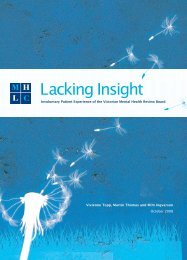Reducing Ethnic Profiling in the European Union - Open Society ...
Reducing Ethnic Profiling in the European Union - Open Society ...
Reducing Ethnic Profiling in the European Union - Open Society ...
- No tags were found...
You also want an ePaper? Increase the reach of your titles
YUMPU automatically turns print PDFs into web optimized ePapers that Google loves.
officers and <strong>the</strong>ir supervisors (who are required to sign off <strong>the</strong> forms) are aware that<strong>the</strong>ir practice is be<strong>in</strong>g scrut<strong>in</strong>ized. The scrut<strong>in</strong>y panels are organized by <strong>the</strong> police,and are thus embedded with<strong>in</strong> <strong>in</strong>stitutional structures and more likely to feed <strong>in</strong>tooperational decision-mak<strong>in</strong>g. There is clear evidence of police commitment to <strong>the</strong>panels and will<strong>in</strong>gness to respond to problems raised. The evaluation found improvements<strong>in</strong> <strong>the</strong> quality of record<strong>in</strong>g and <strong>the</strong> supervision of that record<strong>in</strong>g.In 2008, <strong>the</strong> Suffolk Constabulary formed a stop and search reference panel. Researchconducted by <strong>the</strong> Ipswich and Suffolk Council for Racial Equality (ISCRE) found that<strong>in</strong> Suffolk black people were stopped at a rate 9 times greater than <strong>the</strong> rate for whitepeople; higher than <strong>the</strong> national average, and <strong>in</strong> some rural parts of <strong>the</strong> county this<strong>in</strong>creased to rates as high as 22 to 1. 239 This research led to <strong>the</strong> development of a stopand search scrut<strong>in</strong>y panel organized by <strong>the</strong> Equality Council, sitt<strong>in</strong>g <strong>in</strong>dependentlyof <strong>the</strong> police. The group meets monthly <strong>in</strong> <strong>the</strong> even<strong>in</strong>g at different locations around<strong>the</strong> county. The group scrut<strong>in</strong>izes district-wide performance, look<strong>in</strong>g at all stops andsearches of people from ethnic m<strong>in</strong>ority backgrounds. Forms are reviewed <strong>in</strong> advanceof each monthly meet<strong>in</strong>g by <strong>the</strong> Equality Council and a number are brought forwardto <strong>the</strong> police for discussion at <strong>the</strong> meet<strong>in</strong>g. The police provide <strong>in</strong>formation on <strong>the</strong>stops to <strong>the</strong> group which is <strong>the</strong>n discussed. The panel also discusses compla<strong>in</strong>tsabout stop and search reported by third parties; monitors <strong>the</strong> impact of <strong>the</strong> use ofstop and search <strong>in</strong> <strong>the</strong> community; and contributes to <strong>the</strong> forces’ stop-and-searchpolicy, procedures and tra<strong>in</strong><strong>in</strong>g. (Please see Appendix A for <strong>the</strong> Suffolk stop form.)The Suffolk scrut<strong>in</strong>y panel has wide and diverse community participation, encouragedby <strong>the</strong> <strong>in</strong>dependence of <strong>the</strong> Equality Council. Meet<strong>in</strong>gs are challeng<strong>in</strong>g and, becausecommunity members have a good understand<strong>in</strong>g of <strong>the</strong> law and context surround<strong>in</strong>gstop-and-search practice, provide a real opportunity to hold officers accountable for<strong>the</strong>ir actions. Where officer completion of stop forms is done well, <strong>the</strong>y get positivefeedback. Where forms are poorly completed and <strong>the</strong> grounds for <strong>the</strong> stop are questionable,follow-up action ranges from words of advice to management action. Someofficers and sergeants have been encouraged to attend <strong>the</strong> meet<strong>in</strong>g <strong>in</strong> order to properlyunderstand <strong>the</strong> impact of <strong>the</strong>ir actions. The reference group is currently explor<strong>in</strong>ghow to <strong>in</strong>clude quantitative stop-and-search data <strong>in</strong> <strong>the</strong>ir scrut<strong>in</strong>y, and ensure thatdiscussions at <strong>the</strong> reference group feed <strong>in</strong>to operational decision-mak<strong>in</strong>g.In Ireland, <strong>the</strong> Inter-Racial Cultural Office holds an annual consultation meet<strong>in</strong>gwith ethnic m<strong>in</strong>ority communities to discuss best practice, m<strong>in</strong>orities’ needs and concerns,<strong>the</strong> work of ethnic liaison officers, among o<strong>the</strong>r topics. In 2008, <strong>the</strong> researchunit of <strong>the</strong> Inter-racial Cultural Office distributed questionnaires to gauge m<strong>in</strong>orities’op<strong>in</strong>ions of <strong>the</strong> police. Ireland also has local consultation forums, and super<strong>in</strong>tendentsare required to meet with m<strong>in</strong>ority groups <strong>in</strong> <strong>the</strong>ir district four times a year to discussREDUCING ETHNIC PROFILING IN THE EUROPEAN UNION 159
















